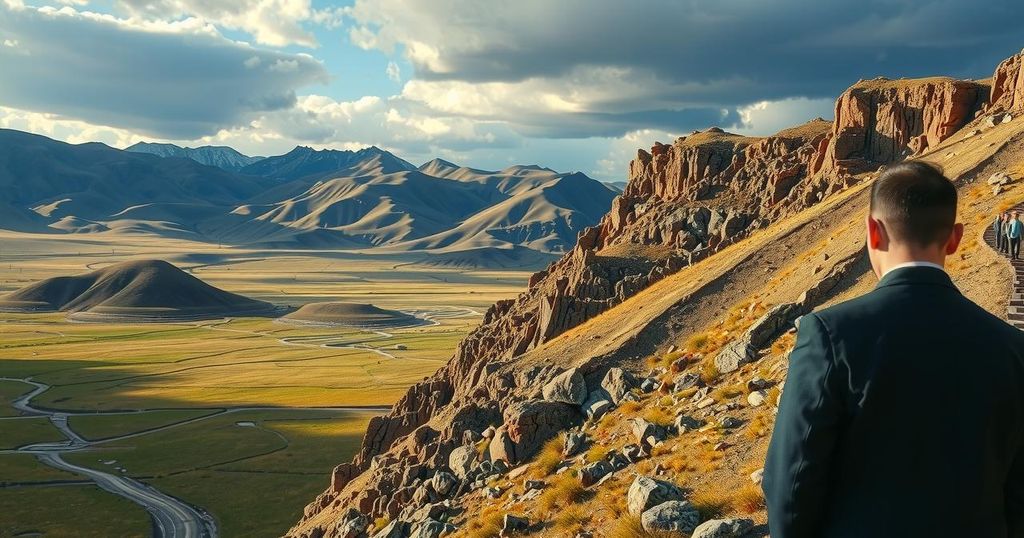Diplomatic Renaissance: An Analysis of Tokayev’s Visit to Mongolia
Kassym-Jomart Tokayev’s state visit to Mongolia marks a diplomatic revival, strengthening historical ties, and paving the way for significant economic agreements. The discussions included raising trade turnover expectations to $500 million, as well as cooperation in space technology and nuclear energy, reflecting both countries’ shared ambitions in critical minerals exploration.
The recent diplomatic visit of Kazakhstan’s president, Kassym-Jomart Tokayev, to Mongolia marked a significant event as it was the first such visit in 16 years. This trip is indicative of Kazakhstan’s renewed efforts to strengthen strategic partnerships in Central Asia. Historically, Kazakhstan and Mongolia have maintained diplomatic relations for over 32 years, yet actual collaboration was limited under the presidency of Nursultan Nazarbayev due to various regional political dynamics, including unrest and protests within Mongolia.The unyielding historical ties are compounded by a prominent Kazakh diaspora in Mongolia, numbering over 117,000, which positions Kazakhstan favorably for enhanced cooperation. Media presence, comprising a Kazakh newspaper and television broadcasts, further illustrates the cultural connections between the two nations. During Tokayev’s visit, discussions with Mongolian President Ukhnaagiin Khurelsukh revolved around establishing strategic partnerships. Notably, there have been efforts to rejuvenate trade relationships, which had previously seen declining figures from 2017 to 2020 attributed partly to the pandemic’s impact on commerce. However, by the end of 2023, trade volumes surged to $150 million, prompting Tokayev to project ambitious trade goals of reaching $500 million in the near future. The significance of this visit extended beyond mere economic discourse; it also included substantial agreements, particularly in space technology and energy. An investment agreement was signed for satellite mapping services, marking Kazakhstan’s entry into satellite production, a critical facet of modern science and technology. Additionally, a memorandum on nuclear energy cooperation was established, leveraging Kazakhstan’s expertise in its nuclear sector, which is poised for development by Mongolian authorities.This partnership also encompasses prospective joint ventures in the exploration and development of various critical minerals, vital for advanced technological applications. Rustem Mustafin, deputy director of the Center for Political Studies at Kazakhstan’s Institute for Philosophy, Political Science and Religious Studies, noted that the potential for collaboration in this area is immense, given the growing demand for such materials globally. Furthermore, Mustafin emphasized the significance of creating investment-friendly conditions aimed at diversifying and enhancing economic cooperation between the two nations. He pointed out the importance of local development through education and innovation to fortify their respective economies.
The relationship between Kazakhstan and Mongolia has often been overshadowed by geopolitical concerns and internal issues, including violent protests in Mongolia that affected regional perceptions. The last presidential visit to Mongolia by a Kazakh leader was in 2007, reflecting a hiatus in diplomatic engagements due to these political sensitivities. Despite a notable Kazakh presence in Mongolia, substantiated by cultural links and a substantial diaspora, both countries failed to leverage their potential for collaboration fully. Recent global trends in trade and resource demands have created a renewed impetus for Kazakhstan to strengthen ties with Mongolia, a nation that shares historical and cultural connections with it. Notably, this visit comes at a time when both countries are looking to diversify their economies and explore new opportunities together, particularly in critical mineral sectors that are witnessing increased global interest.
In conclusion, President Kassym-Jomart Tokayev’s visit to Mongolia signifies a transformative approach in Kazakhstan’s foreign policy, aiming to reinvigorate diplomatic and trade relations after a lengthy period of dormancy. The visit not only celebrated the historical ties between the nations but also laid the groundwork for substantial cooperative ventures in critical sectors like space technology and nuclear energy. As both countries endeavor to capitalize on their shared resources, strategic partnerships may lead to mutually beneficial outcomes, enhancing regional stability and economic development.
Original Source: timesca.com




Post Comment